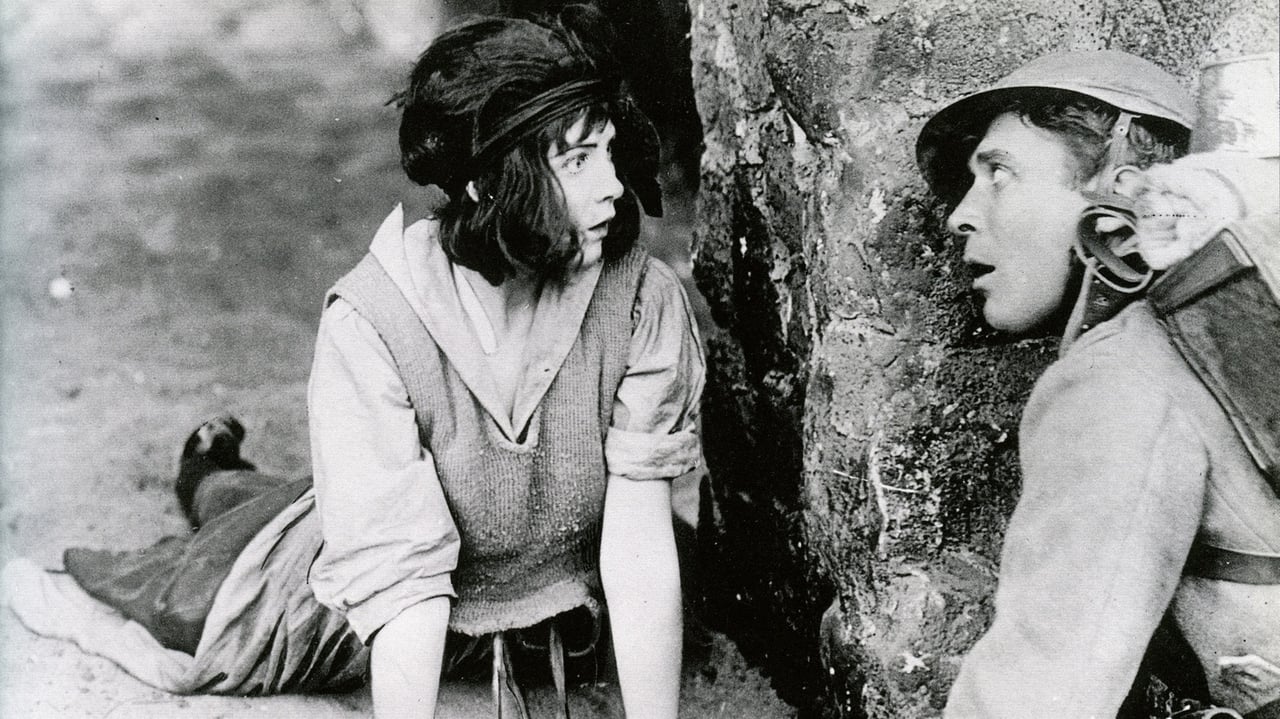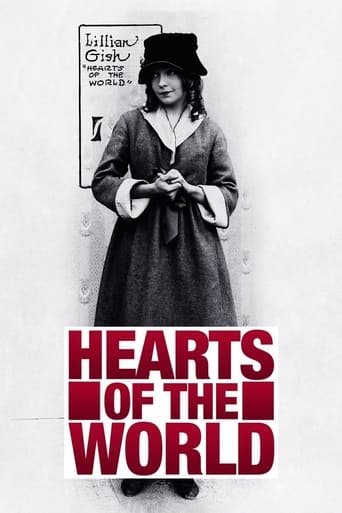

(Flash Review)Kicking off a romantic relationship as WWI erupts is certainly inconvenient. This scenario was done more convincingly than during the movie Pearl Harbor. ZING! In this film, the female lead and her love interest kick off the film as wartime events slowly move in and interfere. Her man is called into action throwing a wrench into their wedding plans. Will they ever marry? Will they both survive the war? There were many solid tense moments, which were probably very tense for the time period. Director Griffith doesn't shy away from highlighting the evils of war complimented by the honor of those who fought in the trenches and the honor many of the village locals have for their homeland. This film may have been Griffith's response to WWI as this came out as it was winding down. Overall, the film felt long despite being peppered with many early battle scenes with tanks, explosions, combat and tragedy. Another solid film for the Griffith resume.
... View MoreHEARTS OF THE WORLD (Paramount/Artcraft, 1918), under personal direction by D.W. Griffith, which lives up to it's subtitle, "an old-fashioned play with a new fashioned theme," is an important contribution to the American silent screen. Known as a propaganda effort, Griffith brings forth his feelings towards war with opening inter-title: "God help the nation that begins another war of conquest of meddling. Brass bands and clanging sabers make fine music, but let us remember that there is another side of war. After all, does war settle any question? The south was divided - thousands of lives were sacrificed by the Civil War, yet did it really settle the black and white problem in this country?" Following the pattern of Griffith's controversial melodrama, THE BIRTH OF A NATION (1915), HEARTS OF THE WORLD, at two hours, is very much a recycling of that epic, moving its time frame from the Civil War South (1861-1865) to its more recent battleground of the World War (1914-1918), making this particular one something from the time capsule.The narrative begins during the peaceful days of 1912 in an unnamed French village where two American families, the Hamiltons (Jack Cosgrove and Kate Bruce) and the Stephensons (Adolphe Lestina and Josephine Crowell) live in a double house on the Rue De La Paix (Street of Peace). Marie Stephenson (Lillian Gish), having just returned from her visit with her aunt in Rheims, and Douglas Gordon Hamilton (Robert Harron), an artist and poet just back from Paris, with three younger brothers (Marion Simmons, Francis Marion) and the littlest one (Ben Alexander) who worships him, the neighboring boy and girl eventually meet, start a courtship that turns to eternal love. On the day of their wedding, war is declared. Douglas enlists along with his friends, Cuckoo (Robert Anderson), and the village carpenter (George Fawcett), calling themselves "The Three Musketeers." As Douglas leaves Marie to fight for France, so does Cuckoo, who has fallen in love with a street singer known as "The Little Disturber" (Dorothy Gish). As the men face uncertainties fighting in the trenches, the once peaceful village is taken over by Von Strohm (George Siegmann), leader of the enemy Germans who once lived in that village, not only has his regiment burn portions of it, but places the women to extreme measures working labor jobs, to be brutally whipped (namely Marie) when unable to fulfill their tasks. Part II, "Struggle of Civilization" soon follows.In spite of its age, HEARTS OF THE WORLD is fine storytelling with many elements now associated by Griffith, from the development of his central characters (the Griffith trademark where families affectionately kiss on the mouth); to his attention to detail with the camera recording fine visuals of actual location footage around France, and inter-cutting between war on the front and survival in the village. The scene where the younger Hamilton boys taking it upon themselves to bury their dead mother ("No prayers, save childish tears") is highly effective and quite moving. With the large cast headed by Griffith's most frequent co-stars, Lillian Gish and Robert Harron, the center of attention is nearly drawn towards Lillian's sister, Dorothy. The Gish sisters, who share little screen time together, work remarkably well in their assigned roles. Lillian, an outstanding actress here in the manner of Mary Pickford sporting curly hair, starts off her girlish charms as the aggressor attracting the boy next door, maturing as the story progresses. Her most dramatic moment occurs following the death of her mother. Her facial change of emotions from disbelief to shock is realistically done. Under incapable hands, this scene would have been laughable. Another scene worth noting occurs later as Gish's character walks aimlessly through the battlefield only to find her wounded beloved (Harron), whom she mistakes as dead. As for Dorothy, she provides the lighter side to the story with her comedic flair as the flirtatious young girl who attracts men with a blink of an eye. At one point she forces herself upon the boy (Harron) the very moment to be spotted by the girl (Lillian) who loves him. Wearing a large beret over her very dark hair and sporting ordinary clothes, her role could very well be the predecessor to Renee Adoree's performance in King Vidor's epic war drama, THE BIG PARADE (MGM, 1925) or categorized as a predate of the high-spirited Clara Bow of the 1920s. Regardless, Dorothy Gish, an underrated actress whose many movies lack availability today, deserves praise for her work as "The Little Disturber." Other members in support are include L. Lowery (The Deaf and Blind Musician); George Nichols (The German Sergeant); Erich Von Stroheim (The German Soldier); and Fay Holderness (The Innkeeper). Appearing briefly are Mary Gish (Lillian & Dorothy's mother); and future playwright/actor Noel Coward as a man with wheelbarrow.With occasional revivals at New York City's Museum of Modern Art's film department, HEARTS OF THE WORLD was introduced to New York's own public television WNET, Channel 13, in September 1977, as part of its weekly series, "Films of Persuasion," the second movie following the premiere presentation of Griffith's BIRTH OF A NATION. Distributed to home video in 1991, with excellent piano score by William Perry from the Killiam Collection, HEARTS OF THE WORLD did have limited cable TV presentation on Turner Classic Movies "Silent Sunday Nights" where it premiered in January 2, 2000. Though presented on VHS, the two minute prologue prior to the movie showing D.W. Griffith filming in the British line of Cambrin, 50 yards from enemy lines, concluding with he shaking the land of prime minister David Lloyd George on 10 Downing Street, is not included in the TCM print.Nearly forgotten, HEARTS OF THE WORLD deserves its place in cinema history, and certainly one to consider for film scholars and historians to view and study as one of the few movies from that era not to be lost to the world. (***)
... View MoreI just returned from a screening of Hearts of the World at the Museum of Modern Art in New York. This screening showed a restored version of the film with live piano accompaniment by the brilliant pianist, Donald Sosin. The film itself was quite spectacular but it was made even more so by the incredible artistry of Donald Sosin. He played for the entire 2 1/2 hours, without a break, and with just a few notated markings. He presented a very operatic treatment of the story, which suited the plot perfectly. I was fascinated by his ability to improvise many musical themes and leitmotivs-all with such great flare and virtuosity. I must admit that these silent films can have very fragile plots but with the right kind of music accompanying them, they take on real substance and even nuance. MOMA should be congratulated for taking silent films so seriously and making sure that they all receive live musical accompaniment
... View MoreTwo American families, the Hamiltons and the Stephensons, have immigrated to a tranquil French village. As the film begins, Robert Harron (as "the Boy" Douglas Hamilton) and Lillian Gish (as "the Girl" Marie Stephenson) return home from separate trips. Lillian is obviously infatuated with Mr. Harron, and sets out to win his heart. Meanwhile, singer Dorothy Gish (as "The Little Disturber") arrives in town; and she, with "perseverance and perfume", also sets her sights on handsome Harron. While Dorothy's efforts at seduction are valiant, Harron proposes to Lillian. As they plan their wedding, their lives are interrupted by a bigger "disturber" - The Great War (now called World War I) This film, another huge hit for the director, was "commissioned" by the British government (note the introduction), and must have secured the blessings of both the U.S. and French governments. The purpose was to create a pro-war, propaganda epic. Although the film is patriotic, and the war is never exactly shown as unnecessary; it leaves an unmistakable impression as an ANTI-war film. So, what started as "A Love Story of the Great War" becomes "A Love Story Interrupted by a Great War". Griffith reveals his true anti-war sentiments with the statement, "After all, does war ever settle any question? The South was ruined - thousands of lives were sacrificed -- by the Civil War; yet, did it really settle the Black and White problem in this country?" (This question also offers, arguably, some redemption for Griffith's tendency for racial insensitivity. It's too bad Griffith's "The Greatest Thing in Life" is currently unavailable; in it, Harron shocked audiences by kissing a dying Black soldier.) In hindsight, it's easy to dismiss "Hearts of the World" as a Griffith production line effort. While it's derivative in film techniques (Griffith's own); it still equals, and sometimes bests, earlier work - for example, witness the improved upon (from "The Birth of a Nation") climatic ending, with Gish frantically trying to escape George Siegmann (as Von Strohm)'s clutches. This, and the battle sequences are, at least, up to the standards set by Griffith; so, it may be unfair to think of "Hearts of the World" as relatively minor. It would likely have won a "Best Picture" of the year, had they been given. Robert Harron would have won an additional "Best Actor" award; and, while Lillian Gish might have lost to Mary Pickford's "Stella Maris", sister Dorothy Gish would have earned a "Best Supporting Actress" award. Also watch for G.W. Bitzer's amazing camera work. The explicit, but appropriate scene of a mother nursing her baby during wartime. Dorothy licking her lips over Harron, but settling for "Cuckoo" Robert Anderson. Griffith's parallel symbolism, right down to Gish's goslings and Harron's little brothers. Lillian wandering into madness, and spending her wedding night with her beloved's "corpse". Griffith "regulars" Siegmann, and "mothers" Kate Bruce and Josephine Crowell, who always stand out in lesser roles. Harron very quietly falling in love with the infatuated Lillian, while being pursued by seductive Dorothy; demonstrating the difference between lust (when he kisses Dorothy back) and love (when he eyes Lillian's figure). There are members of the Harron and Gish families in the cast (and a Walthall), which would be nice to have somebody identify (they are probably somewhere in the opening). Noel Coward may be difficult to recognize; he follows Gish, early on, with a wheelbarrow. Erich von Stroheim is very easy to spot, clicking his Hun heels for the camera. Incredibly, scene-stealing littlest brother Ben Alexander grew up to serve (memorably, as Franz) in Lewis Milestone's "All Quiet on the Western Front" (which owes some debt to this film); later, he co-stared in "Dragnet". ********** Hearts of the World (3/12/18) D.W. Griffith ~ Robert Harron, Lillian Gish, Dorothy Gish, Ben Alexander
... View More